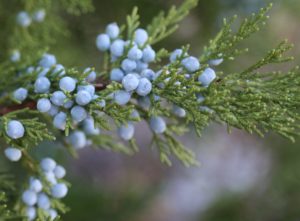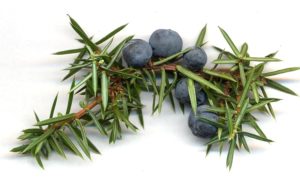It’s the key ingredient in gin. It’s what gives gin its distinctive aroma and flavour. It’s even the reason gin is called gin! But what exactly is juniper?
The sensitive among you might notice there’s a slight pine-like note to the smell of juniper and you’d be right.
Juniper is heavy and resinous,” explains our master distiller Charles Maxwell “and the juniper ‘berry’ is, technically, a pine cone.

The plant it comes from is a coniferous plant found across the globe, from Europe to Asia (and up to the Himalayas), and across North America, in many different terrains and climates. Depending on the species (there are around 60 different species of juniper), it could be a low bush or a tree that can grow to around 50ft (15m) in height.
As well was its silvery-green needles, the plant bears flowers – yellow on the male plants, blue on the female plants. It’s the female plants that also give us the berries, which can take up to three years to ripen. (In the case of Fifty Pounds, the berries come from Tuscany and take two years to develop.)

The berry is said to bring many health benefits. Juniper’s medicinal qualities are the reason it was first used in gin in the Netherlands, but the berry’s medicinal history goes back far longer than the 17th century. There are, reportedly, Egyptian recipes dating back to 1550 BC, prescribing juniper as a cure for tapeworm. It was also burned by various ancient cultures to ward off evil spirits. The Greeks allegedly used juniper as a sedative, native American tribes used it for everything from sprains to consumption, while the Europeans believed juniper oil to be a cure-all for typhoid and cholera. Central American tribes used juniper –well, a tea made from the plant – to treat inflamed stomachs and to aid the safe delivery of babies.

There is some truth to all of this – vapourised juniper oil was found to be effective at preventing air-borne infection during the 1918 Spanish Flu epidemic – and various parts of the juniper plant can be used for their antiseptic, antifungal and diuretic qualities and as a digestive tonic. Claims that your gin and tonic are health drinks, however, may be something of an exaggeration…

